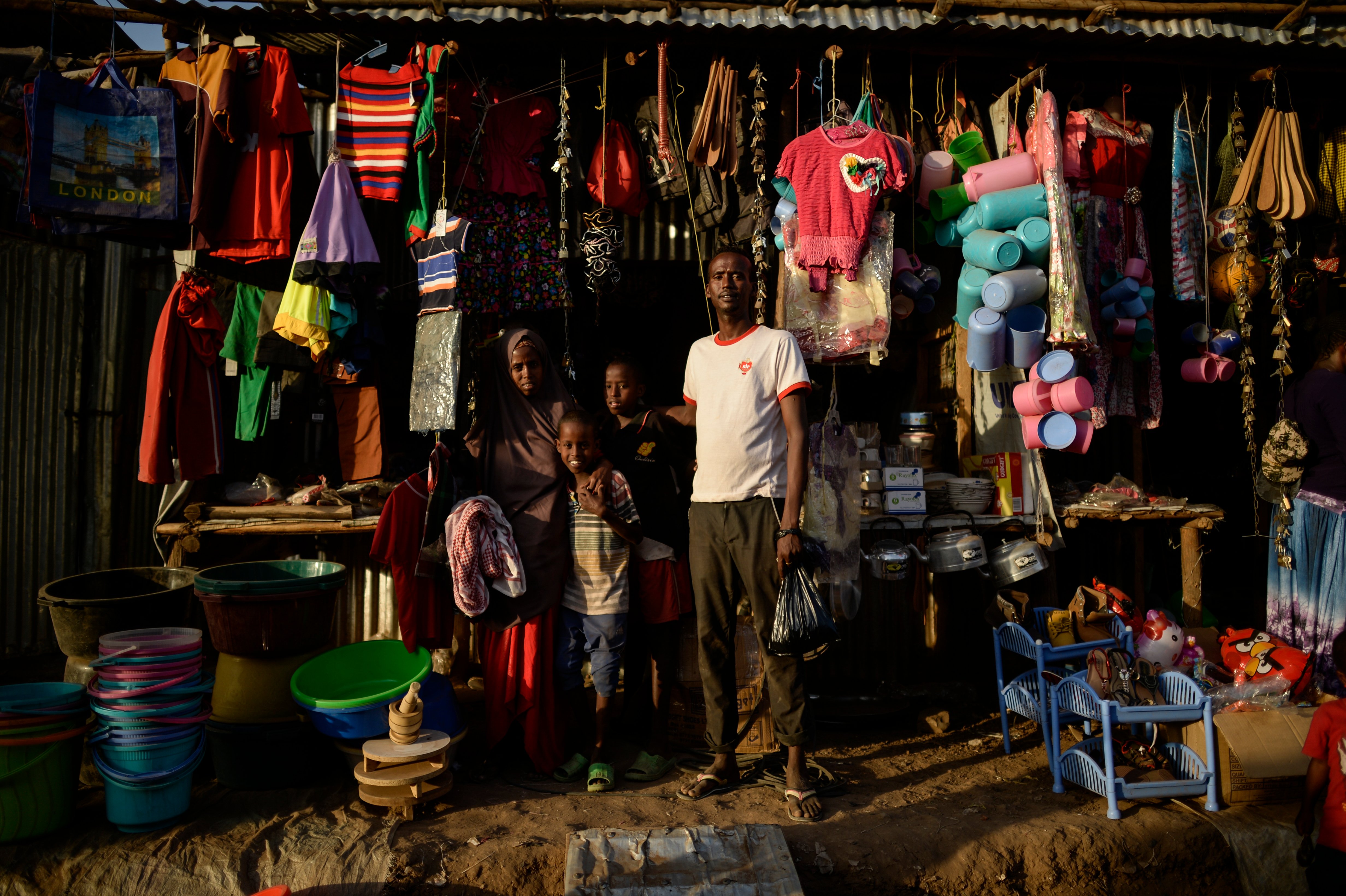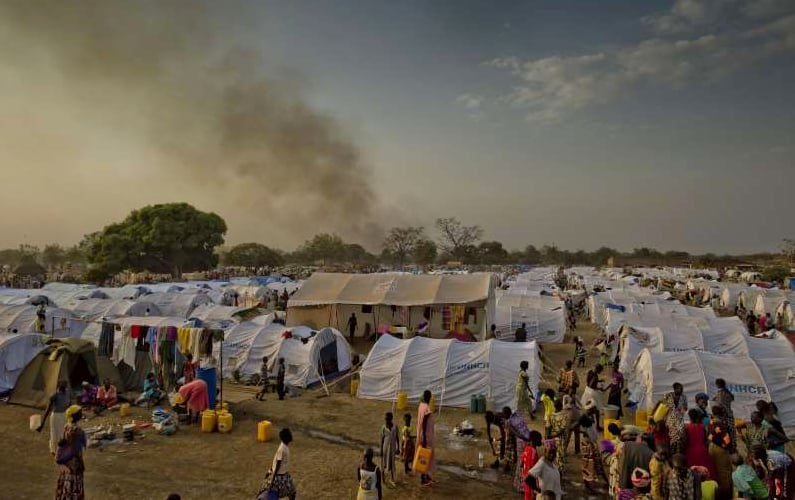Uganda is one of the key testing grounds for a new approach to refugees that emerged from last year’s high-level summit in New York. That approach is supposed to be based on principles of international cooperation and responsibility-sharing among states, and yet Uganda has struggled to secure sufficient donor support to manage the arrival of nearly one million refugees from neighbouring South Sudan, let alone to implement the new model.
The “Comprehensive Refugee Response Framework”, outlined in an annex to the New York Declaration, is to form the basis for a global compact on refugees due to be adopted by member states in 2018. One of the stated objectives of the CRRF is to ease pressure on host countries; another is to expand access to resettlement in third countries. But while Uganda continues to admit an average of 2,000 refugees a day, solidarity from the international community is lagging far behind the commitments made in New York.
At a fundraising summit in Entebbe on 22 June, Uganda and the UN appealed for $2 billion to assist the country’s emergency response to the influx from South Sudan as well as to fund the longer-term, more sustainable response envisaged by the CRRF. But donor governments pledged only $352 million and while further pledges have been made in the past two weeks, the current total still falls far short of the $637 million the UN estimates is needed just to cover the emergency response in Uganda.
The disappointing outcome of the summit has raised questions about the future of the CRRF and the global compact and how the new framework can be implemented in other countries with less progressive refugee policies than Uganda’s that attract even less funding.
“Uganda is a shining example when it comes to hosting refugees,” pointed out Gabriella Waaijman, the Norwegian Refugee Council’s regional director for the Horn of Africa. “They are allowing refugees the right to work and freedom of movement, giving them land. These were all highlighted as key ingredients for the CRRF and the global compact for refugees.
“All these agendas are being pushed by donors, and then there is an opportunity and a conducive environment, and this is the response,” she protested, referring to the outcome of summit. “This is not enough.”
“Breaking point”
Ahead of the summit, Uganda had been warning for months that the influx from South Sudan was pushing it to “breaking point”. A March statement made jointly by the Ugandan government and the UN’s refugee agency, UNHCR, noted that “in the face of severe underfunding and the fastest-growing refugee emergency in the world, Uganda’s ability to realise a model that allows refugees to thrive now risks being jeopardised – and the future of the new comprehensive refugee response framework thrown into question.”
Speaking to IRIN over the phone after the fundraising summit, Apollo Kazunga, Uganda’s commissioner for refugees, said the government remained committed to the CRRF, but that without more funding, it would not be able to implement many of the interventions that would have taken the response beyond an emergency one.
Waaijman pointed out that even the emergency response is severely under-funded. The World Food Programme was forced to halve rations for 800,000 South Sudanese refugees starting in late May. Funding for water and sanitation is also lacking, and health and education services over-stretched.
“If world leaders want to come to New York and say beautiful words, they create hope. But we can’t provide food and water based on hope. We need money and commitments,” Waaijman told IRIN.
One source of hope for the CRRF is that its “whole-of-society” approach will generate new partnerships with development actors and, more importantly, new sources of funding. Last year, the World Bank approved $175 million in financing to support socio-economic development in refugee-hosting communities in the Horn of Africa, including $50 million to Uganda.
The Bank has allocated a further $2 billion in grants and concessional loans over the next three years to finance projects in low-income countries hosting large numbers of refugees. According to a spokesperson with the World Bank, to qualify for the funding, “governments will need to provide a strategy that describes concrete steps towards long-term solutions that benefit refugees and host communities”.
However, it’s early days for the Bank’s involvement in refugee responses and there are questions around whether a country that is hosting over 1.2 million refugees should have to borrow money to finance its response, however favourable the loan terms. Others wonder how willing the World Bank will be to engage in more precarious emergency settings.
“We’re still very cautious of saying the World Bank can come in as the saviour of the financing gap, primarily because we have a big question around what level of risk tolerance they have in times of crisis,” said James Munn, director of humanitarian policy for the NRC. “They’re used to working in a bilateral way with governments, so how does that work where governments are fragile or not really working?”
The World Bank’s spokesperson responded that the Bank is already active in countries affected by fragility and conflict and that allocation of resources to such countries is set to double.
Low-hanging fruit
Volker Türk, assistant high commissioner for protection at UNHCR, which has been tasked with leading the CRRF process, has described it as “a paradigm shift”. But in many ways, the framework represents an approach to refugee management that already existed in Uganda. Key elements of both the CRRF and Ugandan policy are the promotion of refugee self-reliance, establishing early links between humanitarian and development efforts, and making investments in national and local systems that benefit host communities as well as refugees.
This means that many of the structures needed to implement the CRRF are already in place. Refugees are included in national development plans, and a programme aimed at bringing together a wider range of partners to develop durable solutions for refugees and host communities (ReHoPE) is in the works. Meanwhile, other countries that have volunteered to trial the CRRF, such as Tanzania, Ethiopia, and Djibouti, are still in the process of reviewing and drafting laws recognising refugees’ right to work and access public services.
With roll-out of the CRRF so far confined to countries in East Africa and Central America, it’s unclear how or if the framework can be implemented in states unwilling to change policies that confine refugees to camps and discourage integration with host populations.
“Freedom of movement and freedom to engage in gainful livelihood activities is really, really key to the whole CRRF concept,” commented Lilu Thapa, country director for the Danish Refugee Council in Uganda and Tanzania. “In some countries where you have very strict camp settings, that might not be possible, and that’s my concern. I think the CRRF will need to be very carefully adapted to local situations.”
‘You host, I pay’?
There’s evidence that some countries are willing to make reforms, possibly in the hope of attracting new funding. Kenya is not among the pilot countries, but the “Somali situation” is covered by the CRRF and may have played a role in the country’s new Refugee Bill, soon to become law. Refugees with certain skills will soon have the right to work and use land for business or farming. Kenya also appears to have retreated from its threat to close the Dadaab refugee camps by the end of May and repatriate all of the mainly Somali refugees living there.

“There are a couple of positive developments in the region,” acknowledged Waaijman of the NRC. “But in terms of reciprocity of the CRRF process, I would have hoped to see more piloting in Europe. I think the UK and France have a lot to learn from Germany and Sweden, for example.
“If the outcome of the CRRF and the compact is that we find some nice programmes in East Africa that we can then fund, then this CRRF is dead in the water,” she added. “The intent of the [New York] Summit was a more equitable distribution of responsibility-sharing. If the translation of that is, ‘You host, I pay’, then that cannot be right.”
Mamadou Dian Balde, deputy director of a CRRF task team made up of 12 members, most of them drawn from UNHCR but also including representatives of the World Bank, the UN’s Development Programme, and the International Committee of the Red Cross, acknowledged concerns about the current limits of responsibility-sharing, but maintained that the CRRF is nevertheless a game-changer.
“It’s about including refugees in their host communities from the start, and rallying sustained support to meet the needs of both groups. We did not have this unprecedented level of political support before the New York Declaration,” he told IRIN.
“The [CRRF’s] four objectives include third-country solutions, and this is something where we need to do more,” he added. “The paradigm shift will take a bit of time. It will go beyond 2018.”
ks/ag






